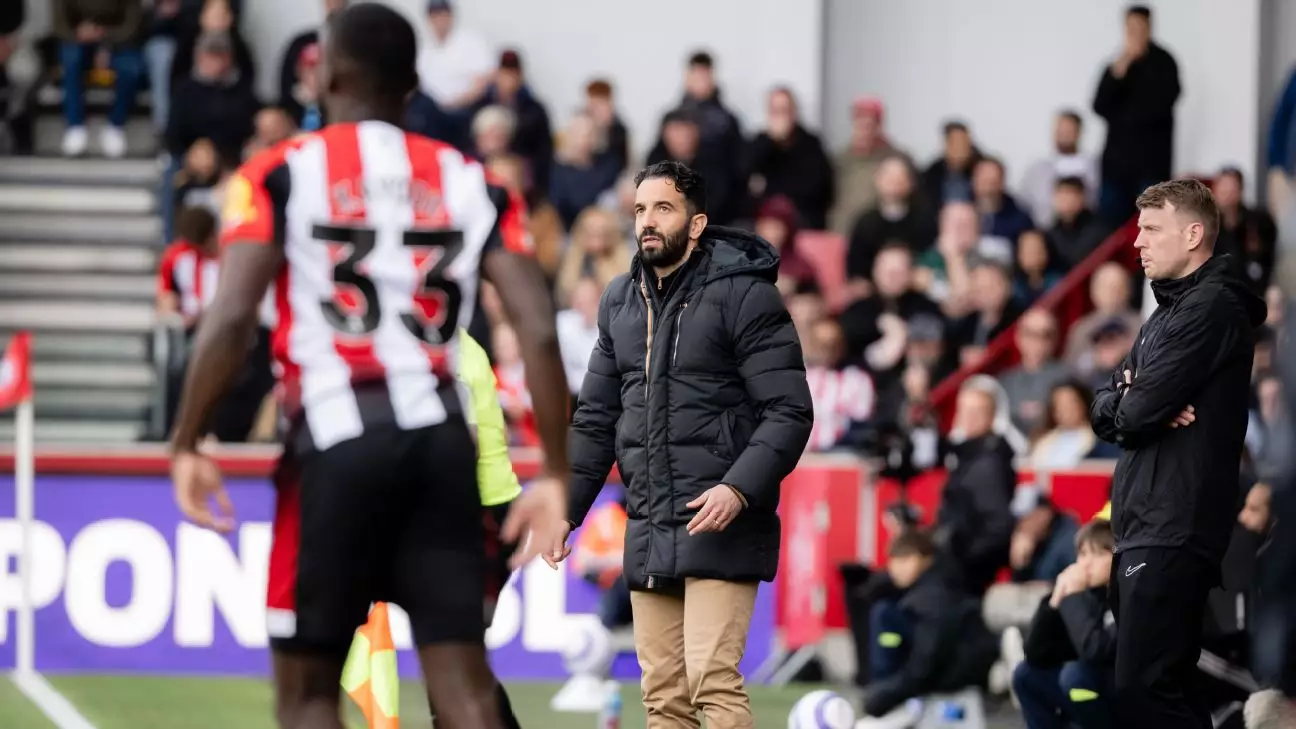Manchester United’s continued descent into uncertainty was starkly evident during their recent 4-3 defeat against Brentford. Under the stewardship of head coach Ruben Amorim, expectations and aspirations seem to be floundering as they grapple with an unusually high number of defeats this season — a staggering record 16 in the Premier League alone. Such numbers are hard to justify in a club with Manchester United’s illustrious history; it’s a troubling narrative that has become all too familiar for the United faithful.
What is particularly disconcerting is the premonition Amorim had entering the match — a foreseen struggle against Brentford’s notorious physicality and strength in set pieces. This reveals a significant coaching dilemma. If a coach anticipates weaknesses in his team’s ability to cope with specific styles of play, it raises questions about preparation and adaptability. If teams are exploiting United’s frailties multiple times over the course of a season, it indicates a lagging evolution in tactics and player development.
The Bitter Irony of Beginnings
The match started with a glimmer of hope as Mason Mount put United ahead. However, it soon transformed into a cruel reminder of the frailty of their defensive strategies. A long throw-in from Michael Kayode turned into an episode of horror as it led to an own goal from Luke Shaw. This moment epitomizes the prevailing fragility ingrained within this United squad. The fact that such basic defensive errors continue to surface speaks volumes about the systemic failings of the defensive structure.
United’s defensive midfielders and defenders alike should have anticipated this type of challenge, yet time and again they fail to manage these moments effectively. It’s not only about individual errors; it’s about a collective failure to learn and adapt, a narrative that has run throughout the season. The inability to address the fundamental aspects of these weaknesses conveys more than poor performance — it speaks to a crisis of confidence and a deeper issue within the club’s core.
The Cost of Youth
Amorim chose to field a remarkably youthful team, with the 17-year-old Chido Obi becoming the youngest player to start a Premier League match for the club. While nurturing young talent is undoubtedly commendable, there emerges the question of whether throwing inexperienced players into the treacherous waters of Premier League football is entirely prudent amidst a tumultuous season.
United’s starting eleven against Brentford had an average age of just over 22 years, a statistic that reveals both a commitment to youth development and an unsettling level of dependency on unseasoned players. While the recent decision to prioritize youth could pay dividends in the long run, in the immediate term, it exposes the team to the harsh realities of Premier League football, which can be unforgiving. The youthfulness of the squad may bode well for the future, but in the present, it leaves them vulnerable and exposed.
The Role of Tactical Flexibility
Amorim’s strategies must evolve. Admitting struggles before games is not enough; he needs to find innovative solutions and deliver tactical flexibility during matches. The second half against Brentford provided an opportunity for change. When United pushed for equality and scored twice, the potential for a comeback felt tangible, only to be dashed by disorganized defense resulting in further Brentford goals shortly after. This reflects a team that disconnects far too easily, unable to maintain concentration and cohesion under pressure.
Moreover, feedback from Amorim’s post-match news conference highlighted important lessons yet to be grasped by his squad. Success in modern football often hinges upon tactical adaptability, especially when facing a physical adversary such as Brentford. If United’s players cannot execute the fundamentals of defending — be it jumping for headers or maintaining focus during critical moments — their vulnerability will only continue to magnify, further distancing them from the competitive edge they so desperately seek.
In a league where pressure builds rapidly and margins for error are razor-thin, United’s recent plight serves as a stark reminder that greatness demands resilience, adaptability, and acute awareness. The journey through this season’s turbulence is far from over, but the path to restoration demands immediate attention and drastic measures. With the Europa League semifinal looming, the question remains: can they regroup in time to shift the narrative surrounding this historic club?

